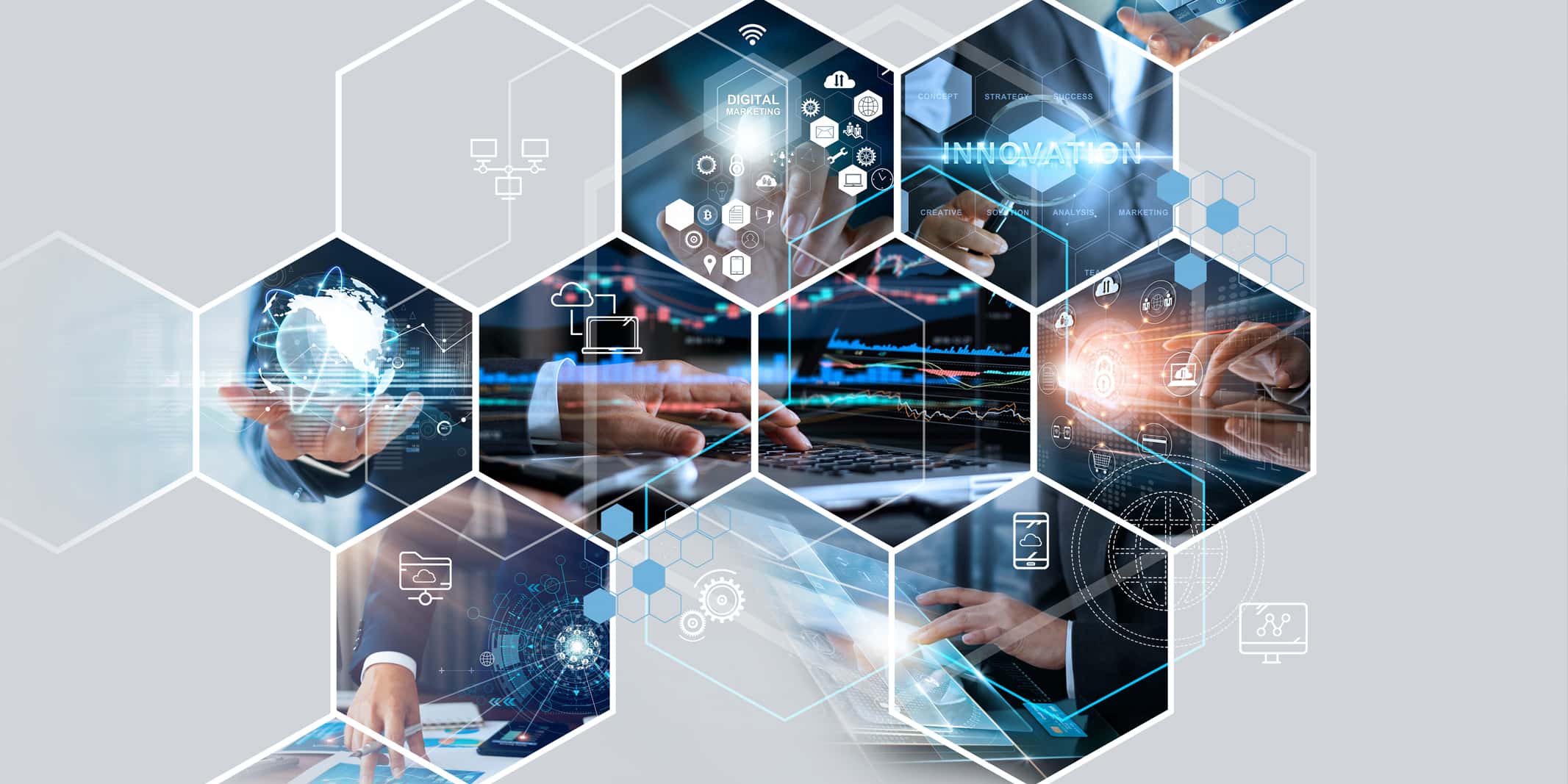Learn the best legacy system modernization approaches
Technology advances at a breakneck pace across a range of business sectors every year. Many businesses agree that staying current with modern business processes is essential to reaching the contemporary customer and producing continual advancement. However, many of these same companies continue to use outdated, or “legacy,” software throughout their practices.
Although legacy software presents serious disadvantages to businesses, many organizations are hesitant to begin modernizing their outdated software. If your company uses outdated programs, C1 can help you achieve successful digital transformation and a modernized system through an efficient legacy modernization project.
Read on to learn the best legacy system modernization approaches and the numerous benefits of updating your company’s software.
What Is Application Modernization, and Why Do Companies Need It?
Application modernization, or legacy system modernization, is the practice of updating outdated programs and software to implement more modern protocols and programming languages. Legacy system modernization is an essential step in a business’s overall digital modernization efforts.
Companies that use legacy software lose out on the benefits of updated systems, such as:
- Modern insights
- Efficiency mechanisms
- Software usability advancements
They often trail behind other organizations in their industries, and their business processes tend to mirror their outdated systems. Additionally, most legacy applications require regular upkeep and maintenance that is more expensive than it is worth. Companies that use these systems may have trouble finding professionals who know how to maintain these systems properly. Instead of investing in new, modern software, these companies waste money maintaining outdated systems that offer few advantages to their companies.
Finally, companies that use legacy software often have trouble integrating more modern programs into their practices, necessitating outdated software in all of their procedures.
Companies cannot take advantage of modern technology while operating legacy software.

What Are the Overall Benefits of Application Modernization?
Legacy system modernization provides a wealth of benefits for systems across industries. Switching to more updated systems can produce the following benefits:
Gives Businesses a Competitive Advantage
Even if a company uses updated business practices, failing to modernize its IT systems could cause it to fall behind other companies in its industry. However, using the latest, most innovative enterprise software within business practices gives business owners an advantage over other companies in their industries.
Creates Opportunities for Future Growth
Legacy systems drastically hinder a business’s success and growth. Transitioning core business operations to an updated system can improve efficiency, allowing companies to focus more on development than maintaining existing processes.
Minimizes External and Internal Security Breaches
Outdated legacy systems typically do not contain the infrastructure necessary to protect business data against modern data breaches and cyberattacks. Internal and external security breaches are rampant among legacy systems. Employees and hackers alike can steal company data through these systems without businesses even realizing it.
However, when businesses modernize legacy systems, they often update their software to include modern security practices that keep their information safe against breaches.
Bridges the Gap Between Customer Expectations and Current Practices
To stay competitive in today’s digital economy, legacy system modernization is essential. Upgrading outdated software can result in improved security, increased efficiency, reduced costs, better customer satisfaction, and optimized data analytics.
According to a State of the Connected Customer report from Salesforce, 75% of customers expect businesses to use new technologies and updated practices in their business models. Even if customers do not see a business’s legacy systems, they can often tell that the company does not use modern practices through the work it produces from its legacy technology.
It’s important to evaluate legacy systems, update legacy software and modernize legacy applications while preserving their core functionality to bridge the gap between expectations for a business and that business’s actual practices—and ultimately create more customer satisfaction. This also includes rewriting software to ensure it is updated and free of harmful programs, retiring or discontinuing any legacy software and replacing it with a new system, and refactoring or modifying the code to improve efficiency, scalability, and performance without changing its functionalities.
Reduces Software Costs and Maximizes Profits
Many businesses running legacy software do not realize how costly it can be to use this outdated technology. Maintaining outdated legacy systems requires high maintenance costs in terms of time and resources, which then diverts resources away from other business areas. Companies that use outdated technologies tend to dedicate most of their IT budget to maintaining these systems, wasting money they could devote to growth and advancement.
One example of the steep running costs of these outdated legacy systems involves the Internal Revenue Service. The IRS still uses IT software that is close to 60 years old. On Tax Day in 2018, the organization failed to process electronic tax returns due to a legacy system error. This mistake was costly for the organization to correct.
In addition, outdated infrastructure doesn’t always offer the storage resources needed to keep up with the demands of a growing business. Outdated systems can also mean loads of technical debt. Newer and better technologies may be available but cannot be implemented because of the limitations of the outdated system. Finally, outdated systems can pose a security risk because they’re far more susceptible to harmful programs and malware.
Because of these challenges, many organizations are evaluating their legacy systems and developing a modernization strategy to update legacy applications and underlying infrastructure. The companies that do can adopt new and better capabilities while reducing the costs and risks associated with maintaining legacy systems and outdated technology.
Modernization improves business value, leading to better profits and financial growth in the long run. Legacy system migration allows businesses to:
- Adopt more modern processes
- Improve efficiency
- Reach more customers
- Increase business value
Legacy system modernization not only saves money previously dedicated to maintaining outdated software.
Optimizes Data Analytics
Modernizing legacy systems gives businesses a newfound opportunity to begin using data-driven business models. Modern accounting software, for example, presents insightful data trends that financial institutions can use to improve customer experience or tailor their approaches strategically.
If businesses do not currently take advantage of data analytics, they can incorporate this new approach into their modernization journeys.
C1 can help organizations with their approaches to legacy systems and help them modernize their legacy applications, allowing them to achieve digital transformation goals and reach their full potential for business growth.
The Best Approach to Legacy System Modernization
The best approach to legacy system modernization depends on the specific needs and goals of the enterprise. A common approach is to evaluate the legacy system to determine its current state, and identify areas that need to be updated or replaced. This can involve updating hardware, upgrading outdated software, or replacing certain components with newer technologies.
Another approach is to gradually modernize the system, making changes as needed to ensure that the business is able to continue to function smoothly. This can involve incorporating new and better capabilities, improving the underlying infrastructure, and reducing technical debt.
Other approaches may involve completely overhauling the legacy system and replacing it with a modernized system. Ultimately, the best approach depends on the resources available, the goals of the enterprise, and the size and complexity of the legacy system.
Most IT experts recognize six primary approaches to application modernization. These include:
- Encapsulation: Integrating the primary legacy component into a modern platform to improve UX.
- Rearchitecting: Changing and improving the legacy code structure to modern application architecture.
- Rebuilding: Implementing custom software development to meet a business’s specific needs.
- Refactoring: Improving a system’s existing code without changing its external processes.
- Rehosting: Moving the existing software from an on-premises data center to a new virtual environment, such as cloud infrastructure.
- Replatforming: Transitioning the entire system, including its data, to a new runtime platform.
Each of these legacy modernization approaches has its advantages and disadvantages. For example, rearchitecting can improve software functionality, but it involves a highly technical process and may disrupt the company’s workflow.
At C1, we tailor each legacy system modernization approach to best suit our clients’ needs. The best software modernization approach for a specific business depends on several factors, such as the business’s systems, the company's industry, and its software goals.
Recommendations When Starting a Modernization Journey
Starting the journey of legacy modernization can feel overwhelming at first, which is why many businesses put off the legacy modernization process as long as possible. However, this transition can be quick and seamless if companies plan strategically before beginning their legacy system modernization process.
Here are a few recommendations to consider before updating legacy systems:
Analyze existing systems objectively
Before businesses can adequately modernize legacy systems, they need to determine what problems within their old systems need addressing.
View modernization as continual improvement
Successful legacy system modernization doesn’t typically have a start and end date. Instead, it is a process that continues as businesses attempt to stay modern with ever-changing technology advancements and business trends. Businesses should view modernization as a business model, not a one-and-done event.
Choose a system with new practices, not just a new release date
The most modern IT software isn’t the one that came out today—it’s the one that uses the most advanced processes and modern interface. When looking for a new system for legacy transformation, businesses should analyze software tools and systems over release dates.
Partner with the right modernization business
At C1, we have helped dozens of companies across various industries implement a strategic legacy modernization approach. Partnering with our team can ensure that a business’s new system benefits its business processes without sacrificing the value of the legacy application.
Working with an experienced IT consultancy firm is the most important step a business can take when beginning its modernization journey.

How C1 Can Help Update Your Legacy System
Is your business considering modernizing your legacy system? If so, C1 can help.
At C1, we use the best techniques in the industry to help businesses achieve profitable digital transformation through legacy modernization and custom application development. A few of our expert IT consulting services include:
- Building advanced analytics platforms
- Creating innovative cloud roadmaps and infrastructure design
- Building new cloud-based applications
- Modernizing existing business tools and programs
- And more!
When you partner with our team, we will create a specialized plan to help your business adhere to modern business requirements for success. We will work to maintain your integral values and facilitate the smoothest software transition possible.
We know the best business software components in the industry, and we enjoy sharing our expert knowledge with businesses across Chicago to help them achieve success. We will walk you through every step of the legacy software modernization process and identify a flexible and secure system that produces the most benefits for your company.
Frequently Asked Questions
How do you modernize a legacy system?
IT consultants utilize several legacy system modernization strategies to update old software and help businesses optimize technology within their practices. However, companies typically follow a process similar to this one to modernize their systems:
-
Assess existing systems: First, businesses need to examine their old systems to determine which ones to update and which to maintain. Talking with an IT consultancy firm can help businesses identify outdated software that they may not realize is lagging behind modern systems.
-
Pinpoint a modernization approach: We listed the six most popular modernization approaches above. Once businesses determine a modernization approach to utilize, they can proceed with their legacy system update process.
-
Create a rough timeline for implementation: While modernization is an ongoing process, businesses should have a rough timeline in mind for when to roll out new systems and when to achieve total integration.
- Begin rolling out the modernization plan: Once businesses achieve the planning and preparation steps above, they can begin implementing their modernization plan. If you’re unsure where to start in the legacy modernizing process, our team can help walk you through the most logical steps for your specific business needs.
How do you manage a legacy system?
Managing outdated programs can be time-consuming and expensive. Often, only certain professionals have the experience and skills necessary to maintain legacy systems. This lack of resources requires companies to track down these specialized professionals and hire them for all of their maintenance needs.
Additionally, because legacy systems stop releasing updates eventually, businesses may need assistance managing modern business practices with outdated programs. They may need to acquire new software to perform some functions while keeping old practices on the obsolete program.
The bottom line: managing a legacy system is more work than it is worth. Absorbing the upfront cost of modernizing your system and software provides a more cost-effective option than maintaining a slow legacy system with data security issues. Businesses that run legacy systems should jumpstart their modernization process to begin saving time and money with more innovative software.
What approaches can an enterprise take for legacy modernization?
An enterprise can take several approaches to legacy modernization, including
- Evaluating existing legacy systems and identifying areas for improvement
- Upgrading outdated software and underlying infrastructure
- Migrating legacy applications to the cloud or to a more modern on-premises data center
- Implementing a modernization strategy that addresses technical debt and improves business growth
- Developing a plan to replace or modernize legacy apps with new and better capabilities
- Using new storage resources and other technology to support legacy systems
- Assessing and addressing any harmful programs and legacy code that may be present in the legacy system.
What is a legacy approach?
A legacy approach in IT refers to the use of outdated technology, systems, and processes that have been in place for a long time and are no longer capable of meeting the current business needs. These systems are often referred to as "legacy systems" and are considered a burden on the organization because of their limited capabilities and high maintenance costs. A legacy approach can limit business growth and hinder the organization's ability to adopt new and better capabilities, making it increasingly important for companies to modernize their systems.
What types of changes are made to a legacy system?
During the modernization process, IT consulting practices may take several approaches to change a company’s legacy systems. They may make a few changes to the existing system’s code structure, transition the system to a new platform, or even craft brand-new software from the ground up. The approach a company should take depends on its specific needs and its existing legacy programs.
Some common changes made to legacy systems include:
- Upgrading software components: outdated software components are replaced with newer, more secure versions.
- Refactoring code: the existing code is reorganized and optimized to remove redundancies and improve performance.
- Adding new functionalities: new capabilities are added to the system to keep up with changing business requirements.
- Cloud migration: moving the system to the cloud can help companies take advantage of scalability, cost savings, and increased security.
- Integrating with new technologies: integrating the system with new technologies such as APIs, microservices, and machine learning can help companies achieve new and better business outcomes.
- Data migration: migrating data from the legacy system to a new, more secure and scalable * data store can help improve performance and security.
For more information, contact C1 today.





